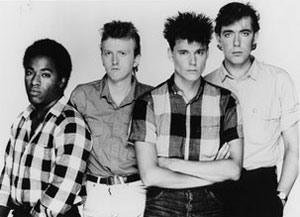 80s - Big Country (2011)
80s - Big Country (2011)
No Place Like Home: The Big Country Story
Big Country are a rock band born out of Dunfermline, Fife, Scotland. They were most popular in the early to mid-1980s, but they still release material for a cult following.
The band were notable for music infused with Scottish folk and martial music styles, as well as for playing and engineering their guitar driven sound to evoke the inspirational spirit of bagpipes, fiddles and other traditional folk instruments.
Having scored incredible commercial success in the late 70s with Scottish pop-punk outfit The Skids, guitarist Stuart Adamson set out in 1981 to do something new - and in the process found even more success and acclaim as leader of the hugely talented Big Country.
Together with guitarist Bruce Watson, bassist Tony Butler and drummer Mark Brzezicki, Adamson launched Big Country in April 1982 and their unique twin guitar based bagpipe sound soon brought them to the attention of Phonogram Records who issued the bands debut 45 Harvest Home in September of the same year.
Though not a hit it did bring the bands name to a much wider audience and following gigs with the likes of The Jam and U2 they finally made the chart breakthrough in April 1983 when the stunning Fields Of Fire (400 Miles) made its way to No. 10 in the UK Top 40.
The follow up In A Big Country reached No. 17 three months later and coincided with their debug UK headlining tour. Their debut album The Crossing, which included their first two singles as well as the superb A Thousand Stars, spent over 80 weeks in the UK charts as well as hitting the top 20s in both Canada and America.
Chance, the only ballad on the LP, gave the group a UK No. 9 hit late 1983 and was followed in early 1984 by a Top 10 placing for Wonderland and a Top 20 slot for East Of Eden whilst their second LP Steeltown actually entered the UK chart in the No. 1 position, proof of Big Countrys incredible rise in popularity amongst the nations record buyers.
Most of 1985 was spent writing the soundtrack to the Restless Natives film and recording their third LP The Seer though early 1986 saw Big Country score their biggest UK chart success when Look Away hit No. 7 in the Top 40. The Seer LP, which included the single, shot to No. 2 and also spanned the bands tenth consecutive Top 30 smash One Great Thing. Though the Hold The Heart 45 incredibly only managed to reach No. 55 at the tail end of the same year.
However, the almost relentless world-wide touring schedule led to Brzezicki quitting in the summer of 1989 (he is now one of the worlds most in demand session drummers) and he was replaced by Pat Ahern who debuted on the early 1990 Top 50 hit Save Me.
The success of a Greatest Hits package later in the same year helped re-establish the bands sound and they fully capitalised on it by scoring a Top 30 position with the No Place Like Home LP as well as chalking up their 17th and 18th UK hit singles courtesy of Republican Party Reptile and Beautiful People as their hit making years moved into a second decade.
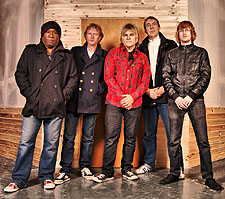
Today Big Country are still a major attraction on the live circuit. Indeed, the surviving original members toured again in late December 2010 and January 2011 with Mike Peters of the Alarm and Jamie Watson added to the lineup. They will play another set of concerts in April 2011 and are also appearing at the Isle of Wight Festival 2011.
Exclusive Magazine recently had the opportunity to chat one-on-one with all three remaining original band members. We talked about the bands heydays, about the band today, about their albums, and, of course, ... Penguins!
Taking it from the top, and Big Country came together after the demise of Stuart Adamsons prior band, The Skids. First on board was Bruce Watson, then came Tony Butler, and then came Mark Brzezicki. In reflection, was it a smooth coming together of new faces back then?
TONY BUTLER - In reflection, was it a smooth coming together of new faces back then, or were there initial speed bumps? These were not speed bumps, more a coming together of like minded people. Stuart, Mark and I knew of each other and enjoyed each others company on the tour we did together (On The Air supporting The Skids). Although there was not any firm arrangement for us to work together after that tour, I jumped at the chance when invited by Ian Grant to come and do a session with Stuart and Bruce at the Phonogram studios. It was obvious to me that the band were shit hot after that session. It was also my first encounter with Chris Briggs (A&R at Phonogram) and I remember the Cheshire cat grin he had on his face when listening back to the recording; the rest is history.
MARK BRZEZICKI - Tony and myself had been a rhythm section with Pete Townshend on his solo projects and had also toured with the Skids as support as a three piece band called On The Air with Simon Townshend. Both Tony and myself had been performing with Pete Townshend at Brockwell Park in London at a right to work march demonstration.
The record company Phonogram where looking for a new rhythm section for a their new band with Stuart and Bruce.
Ian Grant, the then manager of Stuart Adamson had his other act the Members support Pete Towshend on the same show. After performing with Pete Townshend, Ian Grant liked what he heard from us that day and invited both Tony and myself to do some demos for Phonogram. We all loved the result and took up the offer to join the band.
BRUCE WATSON - Both Mark and Tony arrived at the same time. Actually, Mark was ten minutes late, but then again he is a drummer!
Once together though and success was pretty instant! For, the second single, Fields of Fire hit the UK Singles Chart Top 10, the debut album The Crossing sold over 3 million (earning two Grammy nominations), and you supported The Jam at Wembley for six straight nights on their farewell dates! Was this a rollercoaster ride you were all happy to be instantly on, or did it come a little too soon?
BUTLER - No, we were all ready for it. It seemed natural. For some reason, the early success seemed to feel right. When Steve Lillywhite got involved, it really seemed like the momentum was with us. Steve was an immense inspiration, Chris Briggs support was immense, the label became a huge support and Ian Grant was allowed to do what he did best which was to steer the group and the industry into successful waters. It was a very bizarre time, to be at the centre of wheels in motion was awesome. By the time the early singles began to chart, we were an extremely accomplished live act. The Jam shows definitely trumpeted our arrival as a potent live force.
BRZEZICKI - Success can never come too soon.
If you are successful, it means you must be doing something right, so do not mess with it.
We were on a roll and you just go with it.
It just seemed right.
WATSON - Back then this was all new to me so I just let it all unfold in front of me. I never knew any different.
Amazingly, and something I do not think a lot of people know, Big Countrys sound drew from Scottish traditional music, but nobody in the band was actually born in Scotland! Did this confuse interviewers at the time, who expected to hear a bunch of Scots chatter away - or did you ham it up for them, faking a Scottish brogue, perhaps?
BUTLER - The whole Scottish thing was kind of played up too initially. Although Stuart and Bruce were not born on Scottish soil, they were brought up as Scots and were proud to be. Their accents were real. Back during our first meeting at the recording studio, I found it difficult understanding Bruces accent, it was so strong. Stuart, by this time, because of his experience with London during The Skids had learned to temper his accent. The sound of the band was a development of melodies with minor keys and rock guitar with the blues bends. The drone idea was definitely something that Stuart developed as part of his guitar style. To have a continual bass note underpinning a topline melody was just a way of playing a tune and accompanying yourself with the drone (hence the bagpipe reference). Cranked through amplifiers, with some delay echo and reverb, it made an incredible sound.
BRZEZICKI - Nobody in their right mind would put on a false accent! Stuart and Bruce had such a broad Scottish accent that sub titles where used on tv interviews in America!
WATSON - I was born in Canada and the rest of the guys are English. In America they used to put subtitles in our TV interviews!
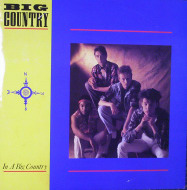
The bands only US Top 40 hit single was In a Big Country in 1983, but why was that, do you think? To your mind, did subsequent singles/albums not get as much promotion and exposure over here?
BUTLER - We just did not spend enough time there. We had been presented with opportunities to tour with some very high profile bands but by this time, Stuart was beginning to lose his lust for touring. We had done so much work in Europe during The Crossing time, that we were very tired. The US company were very excited about the band and seemed ready to support us. This was less apparent after they were presented with our second album Steeltown. I just think that they did not get it. Although the album went to number one in Britain, the British company did not get it either. I think they were expecting The Crossing Part 2, what they got a deep dark introspective piece that was very reflective of the band at the time. After this album, it seemed that things went very quiet in the US until Look Away rekindled some interest there.
BRZEZICKI - The music business in the USA at the time felt the need to pigeon hole the style of music so as to place different styles into some uniformity for marketing. However Big Country where so unique that it totally confused the American market and thus the powers that be just did not get it.
WATSON - I think because different tracks get released at different times and we were really busy playing elsewhere.
It has been said that something that contributed to the bands unique sound was your early virtuoso use of the e-bow, a device which allows a guitar to sound more like strings, or even a synthesizer. What made you use this e-bow in the very first place, and is it still used in your music today?
BUTLER - The use of the e-bow was a way of playing melodies in a free, extended and sustained way, just like a violin. It features heavily on The Crossing, but we consciously did not use it very much after in fear it became a gimmick. It worked brilliantly on tracks like The Storm but one of my favourite uses was on Eiledon from The Seer. Bruce still uses an e-bow today, when required.
BRZEZICKI - It was the total sum of the parts that gave BC it signature sound.
Swirling Guitars, twin guitar attack, Entwistle-style power bass lines, and pounding marching drums.
The e-bows was all part of the unique experimenting that Bruce and Stuart loved exploring.
The sustain gave the chance to create a string section sound or an entire orchestra that meshed with the harsh guitar sounds forming the BC sound that continues today.
WATSON - The e-bow is not a virtuoso instrument, really anyone can play it. We just played the melodies that fitted the songs. Also the -bow was really not used that much. What you are probably hearing is a guitar.
After many successful UK album releases, come 1988 and you guys headed to LA to record Peace in Our Time with producer, Peter Wolf. Many called this an apparent attempt to regain your dwindling US following, which bared itself out in the decidedly different musical stylings of said album. The trouble is, the album was not well received by the US (or the UK) and sold poorly in general. What happened?
BUTLER - We only ever wanted to evolve. The bands fortunes were never prescribed by the state of our success or lack of. By this time, we all had an attraction for America. To make an album in LA was something we wanted to do. I loved the rock n roll scene in LA, as did Bruce and Mark, and Stuart had a deep passion for Nashville. It was inevitable that we would work in the states. The record company direction was from our US company.
BRZEZICKI - We tried to please too many people and ended up not pleasing ourselves.
The American record company were keen to push BC in America and it was their miss judgement as to how we should be produced.
Hindsight is a wonderful thing.
This was an exciting time for us. We had demoed a whole bunch of material that we had huge ambition for. When we first met Peter Wolf we were not that aware of his track record, but were told this would be a great combination. In short, we were not greatly enamored with the recordings and even less with the mixes. We felt that we were diluted and typecast. We felt the US record company shrink away from it during a playback in their plush office. We had a great respect for Peter Wolf but it was not right.
The songs were great, this has been born out by the way the demos were received when they were subsequently released in our Rarities series. I feel that the record company thought they were going to get an Unforgetable Fire/ Redrocks vibe, but as soon as the realised it was going to be that, they disappeared.
WATSON - We changed label and were taking the new labels advice. Also we were moving in a new direction. I think the next album suffered as well.
The last Big Country new-material album came in 1999 with Driving to Damascus. Now in 2010, will we see a new Big Country album any time soon - and as we are not called Exclusive Magazine for nothing, has this new (proposed) album got a working title, perhaps?
BUTLER - That album was fab. It was great to put together, great to record and the prospect of touring it excited all of us. Unfortunately, due to the calamity of the 1st single not charting because of a packaging technicality, which voided a percent of sales, Stuart lost faith and hope and took himself off to Nashville, were have re-located. It was difficulties all the way after that. The idea of getting involved with new material now is soon to be work in progress. Bruce, Mark and myself have been working on material on and off for some years, some of this was manifested on the BBW (Brzezicki, Butler Watson) mini album In My Name. Having the great vocal of Mike Peters on board will certain give us the ambition to try new material.
BRZEZICKI - It is still early days with the new line up, but one thing is for sure, as musicians, it is natural to want to write new songs together and we all have a desire to see what comes from the new chemistry. Watch this space ...!
WATSON - No recordings to be done in the near future.
And, as mentioned before, with Tony having done some lead vocals for a while, Big Country now has Mike Peters in as lead singer for your UK tour dates. But what is it like having Mike sing the songs that once belonged to Stuarts incredible, stand-out vocal tones?
BUTLER - Stuart will never be replaced. Mike has a great voice and sings the songs in his own style yet sympathetically. He has been received brilliantly well on tour and has quickly gained respect for the way he has approached a potentially difficult situation. Even with the way we set up on stage, Stuarts position is still left vacant.
BRZEZICKI - We are blessed that Mike Peters also has stand out vocal tones and he brings his magic to the songs in his own unique way.
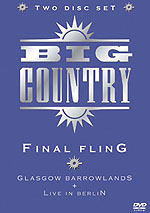
Big Country, as an original line-up, played their last gig together in Kuala Lumper, Malaysia in October of 2000. What can you recall of that day, that show, and was there any little inkling in your mind that it could well truly be the last time you would be on stage together?
BUTLER - I knew it was going to be the last for a while at least, because I left the band and only promised to come back if Stuart could get himself better. He was very ill. We were like a karaoke version of ourselves that day in Kuala Lumpar, it was depressing. On the previous European tour, I had a heart to heart conversation with Stuart about the state of himself and the band. (I wrote and recorded a song called Dream Boy about that conversation).
By leaving the band I felt as though he could have time to take a break to put right whatever was going so badly wrong. Kuala Lumpar was the last straw for me. I never spoke to or saw him again. Although I was shocked and distraught with the news of his death, inwardly, I was not surprised. He was hurting badly inside a year before, what happened in between our last meeting and his passing, I do not know. I miss him though.
BRZEZICKI - In reflection, it was a sad event in the fact that it came to be our last show.
We had already disbanded after the final fling tour so it was almost a stray commitment to do the show that was played half heartedly.
WATSON - It was a lacklustre affair. We all count Barrowlands as our final fling.
OK, here is a fun one, looking at the cover artwork for these three (3) albums, please describe, what was going through your mind at that time:
Steel Town
BUTLER - Depression.
BRZEZICKI - Steel Town is a great cover and still stands up as a classic album design. It has imagery of the working man with an almost post war soviet propaganda poster.
WATSON - Orange and purple - hideous colours!
The Seer
BUTLER - Positive anticipation.
BRZEZICKI - The Seer is just as classic and the strong imagery stood out as a poster for advertising the shows. Many BC fans have the Seer logo as a tattoo!
WATSON - The eagle, a classic Big Country sleeve.
Why The Long Face
BUTLER - Confusion mixed with resigned abandon!
BRZEZICKI - Why The Long Face was taken from a stock photo from the Record labels catalogue.
WATSON - A picture of a dog taken from a stock catalogue!
And with further regard to your album covers, taking a look through them, there is not one that shows the faces of the band! Why did the band wish to have either animated or artsy photographs on its album covers instead of, well, mug shots?!
BUTLER - It was about the music, not the individual forces behind it.
BRZEZICKI - Mug shots were never deemed that important for front covers as we felt that art work imagery should be left to stimulate the viewers imagination as to their meaning.
WATSON - We preferred to keep our faces on the inside or back sleeve. Duran Duran were shitting themselves!
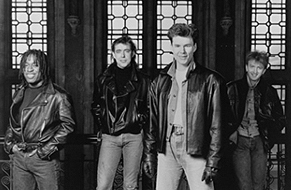
Amazingly, for all these years, save for the tragic passing of Stuart Adamson, the line-up has stayed the same. With original members of any 80s/90s band hard to find these days, what has kept you all together (and friends) for 25 years?
BUTLER - We were and still are great friends; it is what the band was and still is all about.
BRZEZICKI - The music bought us all together and has made each and every one very special to each other.
Music will also keeps us together.
WATSON - Quite simply, we are all still friends.
With Stuart Adamson having tragically passed on in late December, 2001, it is like the whole world stopped for a day. Where were you when you heard the news?
BUTLER - I was at home when Ian Grant called me.
BRZEZICKI - I was driving at the time when I heard the tragic new from Ian Grant.
Will the band, in any connotation, ever come over and play any US gigs, perhaps?
BUTLER - Hopefully.
BRZEZICKI - I would love to see BC come to America as we have unfinished business there.
WATSON - Never
re: the USA, but ... hold me back!
Fun Five - OK, it is now time to fire off some quick questions - to allow those that think they know Big Country to perhaps think again:
a) Can you remember your very first TOTP appearance? What song/year was it and at what level of nervousness were you at that whole day?
BUTLER - 1983, Fields of Fire, I think. Really nervous, keep thinking that my mum was watching. Heavy shit.
BRZEZICKI - 1983 with Fields of Fire, totally excited to be on TOTP and be on the same show that every one watched back in the day.
WATSON - Yes I remember it really well. It was Flowers in the Rain and it was in the mid 60s! That is how drunk I was!
b) Is there one of your songs that you look back on and would today change the title to, or a line/lyric from it - and if so, which one, and why?
BUTLER - None, they are all there for a reason.
BRZEZICKI - No, if its not broken, do not fix it!
WATSON - Would not change a thing.
c) Do you have a recurring nightmare or dream - and if so, how does it usually end?
BUTLER - Yeah, the band never getting the acclaim it so richly deserves. Do not know how it ends but I am hopeful!
BRZEZICKI - I often dream that my drums are not fully set up in time as the concert is about to start.
WATSON - Too busy to have dreams or nightmares!
d) What is your sweetest, guiltiest pleasure (food wise!) late at night?
BUTLER - Chocolate, could it be anything else?
BRZEZICKI - None, I do not ever eat late at night!
WATSON - Cheese on toast, but I had to give them up ... they were giving me nightmares!
e) If you could meet any deceased celebrity, who would it be - and what would be the first question you would ask them?
WATSON - It would have to be Adolf Hitler. I would ask him why he was behaving like a shit, and as a child, was he molested by a family pet. I would then punch him really hard in the throat!
Being that you were one of the bands that appeared at Wembley Stadium for Live Aid (13th July, 1985), what can you remember of that massive day out?
BUTLER - Apart from being very proud to be there to support it, I made a determined effort to get myself and the guys down to the front for the finale. As we did not get to actually play, I wanted my mum to see us there.
BRZEZICKI - I was disappointed BC did not get to perform at Live Aid.
However it was incredible to be there and take part, with us all singing feed the world at the end.
I was on the side of the stage talking to Linda McCartney when Harvey Goldsmith (The promoter) said, Every one on stage please for the last song, Feed The World. Tall ones at the back. So I sang Feed The World with Linda McCartney in front of Stuart Copeland playing the drums!
Happy days.
WATSON - All I remember is thousands of camera flashes and that this was a very big thing indeed.
Also, as I was actually at another Wembley Stadium gig you guys did one summer, maybe you can help me out! You were close to being top of the bill and it also featured Paul Young (who I think was actually the headliner) and a handful of other bands, but the name of the gig (and who else was on it) completely escapes me! Any ideas?
WATSON - Paul pulled out due to illness. It was Elton Johns Summer Of Love concert.
If asked to record one for charity, what 80s (and possibly cheesy!) pop/rock song would you love to cover today...and why?
BUTLER - Not sure we would. Trivializing things for the sake of charity would not sit well with us. It would have to be something with good meaning and credibility, would need to research this further!
BRZEZICKI - We do not do cheesy, we do the right song for the right reason.
WATSON - I would record Just Make Out The Cheque to Brucey Boy by my new band The Charity Whores!
Lastly, and throwing you a journalistic curve ball, Exclusive Magazine loves Penguins (the flightless bird, not the chocolate bar!) ... do you?
BUTLER - Penguins are cool (the chocolate bar is cool too)!
BRZEZICKI - Yes, but it is a subject that will never take off!
WATSON - I love penguins. I just wanna take the f**k off and swim with those little fellas!
Interviewed by: Russell A. Trunk
www.bigcountry.co.uk/home.php
Back To Archives

